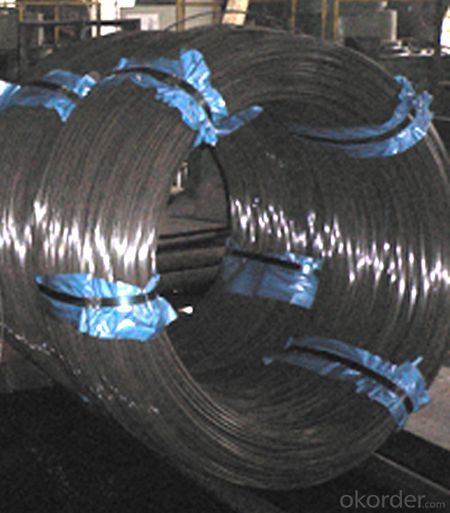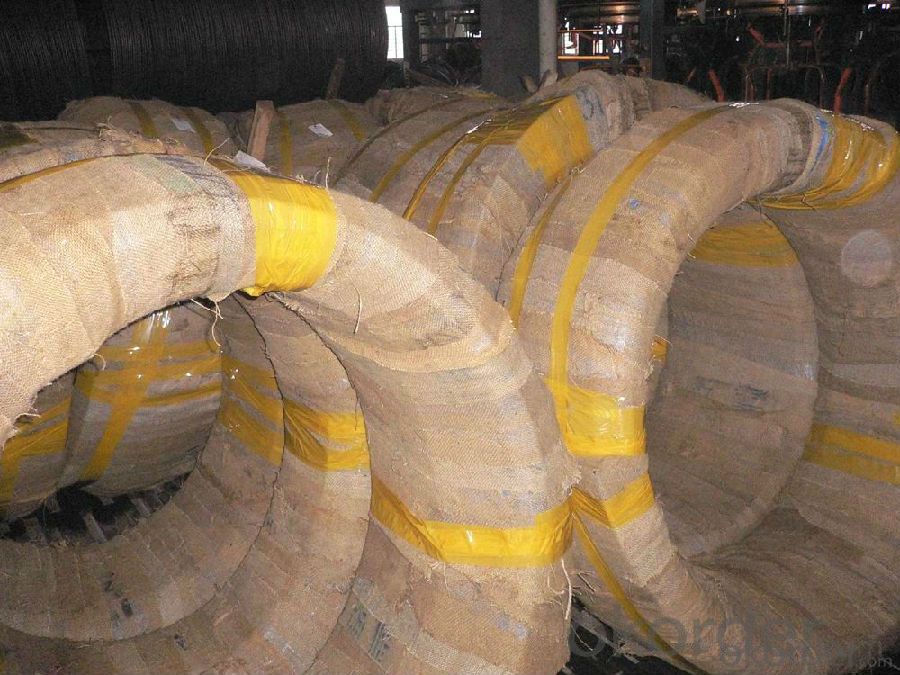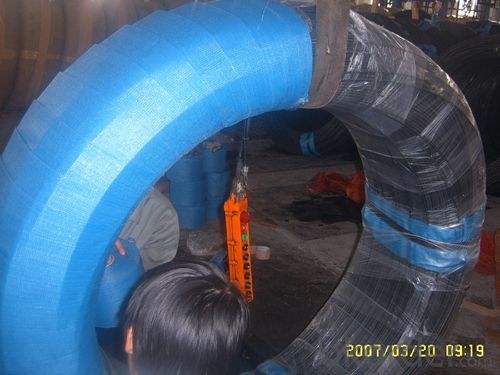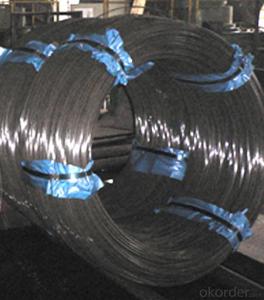HARD DRAWN SPRING STEEL WIRE
- Loading Port:
- China Main Port
- Payment Terms:
- TT OR LC
- Min Order Qty:
- -
- Supply Capability:
- -
OKorder Service Pledge
OKorder Financial Service
You Might Also Like
Steel grade should be 82B,65Mn,70#,72B,M10etc.Size from 0.4-12.0mm,mainly produced into door springs.coil weight can reach 1200KGS.we now export to South africa,SAUDI ARABIA,IRAN and INDIA.
We can satisfying market demands constantly and empoldering new product;can offering wires according to German standards(DIN17223/1,DIN17223/2),American standards(ASTM A227/A227M,ASTM A228/228M,ASTM 231/A231M,ASTM A401/401M),Japanese standards(JIS G3521,JIS G3522,JIS G3560,JIS G3561).and European standards(DIN EN10270-1,DIN10270-2)and so on.



- Q:How does special steel perform in chemical processing applications?
- Due to its outstanding performance and unique properties, special steel finds wide application in chemical processing. Its high resistance to corrosion is a key advantage in this field. Specifically designed to withstand harsh chemical environments, special steel ensures reliability and durability. Compared to other materials, special steel provides superior protection against corrosion in chemical processing applications where corrosive substances are present. It exhibits exceptional resistance to acids, alkalis, and various chemical compounds, guaranteeing the integrity and longevity of equipment and components. In addition, special steel offers excellent mechanical properties, including high strength and toughness, which are essential in chemical processing. It can endure high temperatures, pressure, and mechanical stresses commonly encountered in these environments. Its robustness and ability to maintain structural integrity under extreme conditions make it the preferred choice for critical components such as reactors, vessels, and piping systems. Special steel also contributes to the overall efficiency and safety of chemical processing operations. Its resistance to scaling and fouling reduces the risk of contamination and blockages, minimizing downtime for cleaning and maintenance. As a result, productivity and cost-effectiveness are improved. Furthermore, special steel is frequently chosen for its hygienic properties, making it suitable for use in the food and pharmaceutical industries. It is easy to clean and sanitize, ensuring the highest levels of product purity and compliance with industry regulations. In conclusion, special steel excels in chemical processing applications. Its corrosion resistance, mechanical strength, thermal stability, and hygienic properties make it an ideal choice for equipment and components, enhancing the reliability, efficiency, and safety of chemical processing operations.
- Q:How does special steel contribute to the electronics aftermarket industry?
- Special steel plays a crucial role in the electronics aftermarket industry by providing high-performance materials that are essential for the manufacturing of various electronic components. It contributes to the industry in several ways: 1. Durability and reliability: Special steel alloys offer exceptional strength, hardness, and resistance to wear and corrosion, making them perfect for producing electronic parts that need to withstand harsh operating conditions. This ensures the longevity and reliability of electronic devices, which is a key requirement for the aftermarket industry. 2. Heat dissipation: Many electronic devices generate significant heat during operation, which can affect their performance and lifespan. Special steel alloys with excellent thermal conductivity properties enable efficient heat dissipation, preventing overheating and improving the overall performance of electronic components. 3. Precision manufacturing: Special steel alloys, such as stainless steel, can be machined with high precision, allowing for the production of intricate and complex electronic parts. This is particularly important for the aftermarket industry, as it often involves the replacement or repair of specific components in electronic devices. 4. Electromagnetic shielding: Special steel alloys can be utilized to create electromagnetic shielding, which is crucial in preventing interference and maintaining the integrity of electronic signals. This is especially important for sensitive electronic equipment that may be affected by external electromagnetic fields. 5. Customization and adaptability: Special steel can be customized to meet the specific requirements of electronic devices, allowing for the production of tailor-made components. This versatility enables manufacturers in the electronics aftermarket industry to develop and offer a wide range of specialized products that cater to various consumer needs and preferences. Overall, special steel contributes significantly to the electronics aftermarket industry by providing durable, reliable, and high-performance materials that are essential for the manufacturing of electronic components. Its unique properties enable the production of long-lasting and efficient devices, while also allowing for customization and adaptability to meet the ever-evolving demands of the market.
- Q:What are the challenges in machining special steel with complex geometries?
- Machining special steel with complex geometries poses several challenges. Firstly, the high hardness of special steel makes it difficult to cut and shape. This requires the use of specialized cutting tools and techniques to ensure precision and avoid tool wear. Secondly, the complex geometries of the steel components make it challenging to achieve accurate and consistent machining. This may require the use of advanced CNC machines and software programming to accurately replicate the intricate shapes. Additionally, the heat generated during machining can lead to thermal distortion and surface hardening, which further complicates the process. Therefore, careful planning, efficient cooling, and proper machining parameters are essential to overcome these challenges and achieve the desired results.
- Q:How does special steel contribute to the aerospace structural industry?
- The aerospace structural industry relies heavily on special steel due to its various important attributes needed for building aircraft components. Firstly, special steel possesses exceptional strength and durability, enabling it to withstand the extreme conditions and stresses experienced during flight. This is particularly crucial for critical components like landing gear, engine parts, and wing structures that face high temperatures, pressure, and vibrations. Additionally, special steel exhibits excellent corrosion resistance, which is essential for ensuring the long-lasting and reliable nature of aerospace structures. Aircraft are constantly exposed to harsh environments such as high humidity, saltwater, and chemicals, which can cause corrosion and degradation if not adequately protected. Special steel helps prevent these issues, ensuring the aircraft's structural integrity throughout its lifespan. Moreover, special steel offers other desirable properties including heat resistance, fatigue resistance, and weldability. These characteristics make it suitable for a wide range of aerospace applications such as constructing fuselage frames, engine mounts, fasteners, and hydraulic systems. By utilizing special steel in these components, aerospace manufacturers can achieve lightweight designs without compromising strength and safety. Furthermore, special steel empowers engineers to push the boundaries of aircraft performance by facilitating the development of advanced technologies. For example, the use of special steel alloys in turbine blades allows for higher operating temperatures, improving engine efficiency and reducing fuel consumption. This contributes to the overall sustainability and environmental friendliness of the aerospace industry. In conclusion, special steel is an indispensable material in the aerospace structural industry as it provides the necessary strength, durability, corrosion resistance, and other essential properties required for constructing aircraft components. Its contribution enables the development of safer, more efficient, and technologically advanced aircraft, ultimately benefiting the aerospace industry as a whole.
- Q:How does special steel perform at high temperatures?
- Special steel performs exceptionally well at high temperatures due to its unique composition and properties. Unlike regular steel, special steel is specifically designed to withstand extreme heat conditions without losing its strength or structural integrity. It exhibits excellent thermal stability, resistance to oxidation, and maintains its hardness and toughness even at elevated temperatures. This makes special steel an ideal material for various applications that require reliable performance under high-temperature environments, such as in aerospace, power generation, and industrial processes.
- Q:What are the challenges in machining special steel with high hardness?
- One of the main challenges in machining special steel with high hardness is the increased tool wear. Due to the hardness of the steel, the cutting tools used in the machining process wear out more quickly, leading to shorter tool life and increased tool replacement costs. Additionally, the high hardness of the steel makes it more difficult to achieve accurate and precise machining, as it requires higher cutting forces and can cause issues such as tool chipping or breakage. Specialized machining techniques and tools are often required to overcome these challenges and ensure successful machining of high hardness steel.
- Q:Can special steel be used for making oil and gas industry components?
- Yes, special steel can be used for making oil and gas industry components. Special steels, such as stainless steel and alloy steel, are often preferred in the oil and gas industry due to their exceptional mechanical properties, corrosion resistance, and high temperature resistance. These components are exposed to harsh operating conditions, including corrosive environments, extreme temperatures, and high pressures. Special steels are specifically designed to withstand these conditions and maintain their integrity and performance over time. The use of special steels in the oil and gas industry ensures the reliability, durability, and safety of critical components, such as valves, pipes, fittings, and drilling equipment.
- Q:Can special steel be used for cutting tools?
- Yes, special steel can be used for cutting tools. Special steels, such as high-speed steel or tool steel, are specifically designed to have superior hardness, toughness, and wear resistance, making them ideal for manufacturing cutting tools that can withstand high temperatures and perform precision cutting operations.
- Q:What are the properties of alloy steel?
- Alloy steel is a type of steel that contains additional elements, such as chromium, nickel, or molybdenum, which enhance its mechanical properties. These alloys impart increased strength, hardness, and resistance to corrosion, making alloy steel suitable for various applications. It typically exhibits excellent toughness, durability, and wear resistance, making it ideal for use in construction, automotive, and machinery industries. Additionally, alloy steel can be easily heat treated, allowing for further customization of its properties to meet specific requirements.
- Q:How does special steel contribute to the manufacturing of consumer goods?
- Special steel plays a crucial role in the manufacturing of consumer goods by offering superior strength, durability, and corrosion resistance. It enables the production of high-quality products such as automobiles, appliances, cutlery, and tools, ensuring their longevity and performance. The use of special steel enhances the overall quality and reliability of consumer goods, leading to increased customer satisfaction and product longevity.
1. Manufacturer Overview |
|
|---|---|
| Location | |
| Year Established | |
| Annual Output Value | |
| Main Markets | |
| Company Certifications | |
2. Manufacturer Certificates |
|
|---|---|
| a) Certification Name | |
| Range | |
| Reference | |
| Validity Period | |
3. Manufacturer Capability |
|
|---|---|
| a)Trade Capacity | |
| Nearest Port | |
| Export Percentage | |
| No.of Employees in Trade Department | |
| Language Spoken: | |
| b)Factory Information | |
| Factory Size: | |
| No. of Production Lines | |
| Contract Manufacturing | |
| Product Price Range | |
Send your message to us
HARD DRAWN SPRING STEEL WIRE
- Loading Port:
- China Main Port
- Payment Terms:
- TT OR LC
- Min Order Qty:
- -
- Supply Capability:
- -
OKorder Service Pledge
OKorder Financial Service
Similar products
New products
Hot products
Hot Searches
Related keywords





























